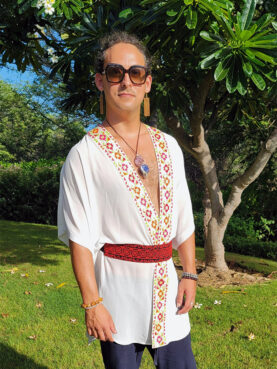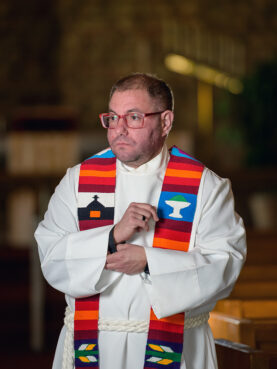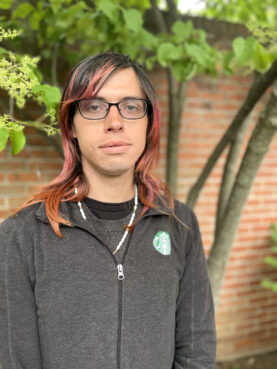(RNS) — Ari Fernandez, a journalist and aspiring rabbi living in Atlanta, began to realize the gender they were assigned at birth wasn’t a good fit in 2018, when they were reconnecting with their Jewish roots by working at Hillel International, a campus faith group.
“When I was first exploring outside of the (gender) binary,” said Fernandez, who was a philosophy student at Appalachian State University at the time, “I wasn’t really aware of how queer Judaism could be.”
Their workmates seemed to feel similarly. “I said, ‘Hey, just so you know, I’m going by Ari now,’ and they all immediately got it,” said Fernandez, now 26. “They were like, ‘Yeah, that makes sense. Of course, you’re Ari. Why wouldn’t you be Ari?’”
As opposition to recognition for transgender Americans has increased in recent months, so have clashes between people with transgender identities and faith leaders. But it’s not always the case that faith and transgender don’t mix. Some transgender seekers, such as Fernandez, have found that the search for a gender identity can often come with a more profound sense of spirituality.
In Judaism, Fernandez pointed out, name changes usually signal a new sense of identity, in which the name changer gets closer to God. Avram and Sarai, the first Jewish patriarch and his wife, became Abraham and Sarah when they made their covenant with Yahweh. After wrestling an angel, Jacob became Israel. Fernandez has written about how their name change made them feel closer to Judaism.
“It was really nice to see these incidents reflected in Jewish text, where people went through a difficult moment, or made a commitment to their faith, and changed their name,” Fernandez said. “It felt really important to me too, because one of the first official documents I put my new name on was my application to rabbinical school. It was like me making a covenant with the Jewish people by agreeing to go into service for them. It just made sense to apply with my new name instead of my dead name.”
Yaffa, executive director of the grassroots organization Muslim Alliance for Sexual and Gender Diversity, also sees exploring gender as a route to deepening religious understanding.

Yaffa wears an embroidered Palestinian kimono while visiting a friend in Kona, Hawaii. Submitted photo
“It goes both ways. Islam has contributed meaning to how I view myself in the world, how I view the world and everything I identify as, but also vice versa,” said Yaffa, 30, who does not use a surname. “As I come into myself and find more and more about myself, I get to practice Islam in a way that’s closer to divinity in a way that I wouldn’t have been able to without that.”
Yaffa explained that deeper spiritual understanding often involves shedding ego, along with all other attachments. One part of the ego is the concept of gender.
“Going through that,” recalled Yaffa, “was the first time I asked, ‘Are queer and trans people better at this?’” Because queer and trans people have “already done the work” to examine what their identity means, Yaffa said, it becomes easier to do so in seeking oneness with a deity.
A Muslim, Yaffa had learned about the 99 names of Allah — sometimes called the 99 attributes — from an early age. Upon growing older, Yaffa began to examine the names through a social justice lens.
“It was so profound,” said Yaffa. “I was able to really sit with the different attributes, taking some time to reflect on what are the things that we need to be showing up with as humans, what are the things that are not ours to do.”
Studying the 99 names in this way taught Yaffa to focus on the original lessons of Islam and how to apply them to community action.
The road was more difficult for the Rev. Shannon T.L. Kearns, a playwright and Old Catholic Church priest. Raised in a fundamentalist Christian church in rural Pennsylvania, Kearns said he was always unsure why he felt different from those around him.

The Rev. Shannon T.L. Kearns prepares to officiate a service in Minneapolis in 2022. Photo by Bre McGee/Uncommon Collaborative
“I grew up in a tradition with very strict gender roles, but also where we didn’t really talk about gender,” said Kearns. “It was a mess! I grew up with no language to talk about gender, but also consistently feeling like I was messing up my gender. It led to a divorce between my soul and my body, which left me feeling hollowed out and disconnected.”
Despite this split, Kearns never fully let go of his faith. As he continued to explore Christianity, he learned that fundamentalist readings of Scripture were not the only way to interpret the Bible and, through reading other people’s stories, saw how differently he had experienced faith.
It was realizing he was trans, though, that helped Kearns repair the rift between his identity and his faith. “Reading Scripture as a trans person opened up the texts in new ways and gave gifts to the church and the world,” said Kearns. “I had new understandings of bodies and scars and resurrection that opened up windows for other people to understand their bodies and scars and resurrection in new ways.”
This journey culminated in his ordination in the Old Catholic Church, a denomination that is independent of the Vatican, becoming its first openly transgender priest. In 2013, he helped to found Queer Theology, an online resource guide for LGBTQ+ Christians.
While some trans people find their way back to the church, Patience Bristol, a trans woman in Berkshire County, Massachusetts, had the church come back to her.

Patience Bristol outside the Berkshire Athenaeum in Pittsfield, Mass. Photo by Emma Ryan
Born into an Irish Catholic family in Massachusetts, Bristol left her faith over the church’s conservative stances before she even knew she was trans. As she transitioned, she dabbled in other faiths, alternating between atheism and studying the occult.
Struggling with her mental health earlier this year, Bristol spent time in the hospital. “At some of the different psych units that I was in, I met some people who were religious, but were like, really awesome. That gave me a new perspective on religion, knowing actually open-minded people who are religious.”
When these accepting churchgoers told Bristol “God loves everyone,” she said, she was more inclined to believe it. After being released from her inpatient stay, she sought out a local church that would accept her for who she is and where she is at in her journey to rediscover faith. In the beginning of June, Bristol was baptized in an Episcopal church. Recently, she helped her church run a booth at the local Pride celebration.
This coverage is presented with the support of the E. Rhodes and Leona B. Carpenter Foundation.





